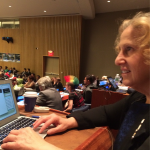 DAI Member Mary Radnofsky has been sending journal like entries reporting on her time at the United Nations event in New York City. Whilst I suspect we have exhausted her as her notes are starting to read like the final stages of a thesis, she has represented us wonderfully well.
DAI Member Mary Radnofsky has been sending journal like entries reporting on her time at the United Nations event in New York City. Whilst I suspect we have exhausted her as her notes are starting to read like the final stages of a thesis, she has represented us wonderfully well.
Living with dementia has its many daily challenges, but to then be amongst mostly strangers, many who probably have very old fashioned stigmatising attitudes about people with dementia, I have nothing but admiration for her. Mary, we all thank you for your considerable effort.
On June 15, 2016 Mary attended a COSP Morning side events promoting the rights of persons with psycho-social and intellectual disabilities, which was sponsored by Inclusion International. There were back-to-back sessions with no real breaks, because she also had to catch people in between, but she has been busy sending updates.
Here are some of Mary's remarks about the first session:
Moderator, Vladimir, echoed the disappointment that no women were voted in. Applauded that Robert Martin was elected, as first deaf person, yes, but that everyone that was elected was a man.
Fatima from Kenya, from Inclusion International (II) talked about the Psychosocial (psd) approach to people living with disabilities (plwd); most plwd live at home, and the families receive little or no support. Communities that are designed to be inclusive will be more welcoming to all families. Self-advocacy is necessary if people are to become included in their own communities. They must raise their voice.
Also, families need financial and support network. But they mostly get information from doctors, so they get mostly only a medical approach, from the time their children are a very young age. So it stays medical. We need to focus on community development efforts that ensure citizens are included. It is not enough to just open the doors. This approach is not sufficient to reach people in remote areas.
This sounds no different to how people with dementia are treated.
Mary wrote of a real contrast between the great Italian efforts and those who argued it was more cost effective to keep disabled people institutionalised. Wow, who would think those attitudes are still even in existence, but to think at an event like this they are prevalent is mildly concerning.
For example, the Italians have closed all mental hospitals. Robert Martin called for the closure of all institutions around the world. It’s so hard, but on behalf of people surviving Psychiatry, he wants to do this. People do not need to be segregated. They are citizens.
SEBASTANO CARDI VP of CRPD
In Italian parliament just adopted new law yesterday: What about the “after” i.e. what happens to the person with disability when parents are no longer there? Plwd always face stigma. Many challenges.
Now, mental hospitals must be closed or used differently. The whole system should be concentrated on community-based facilities. Wants to join forces for a better world.
There was discussions about Psychosocial disabilities (Psd) reported by Mary here;
Yenni Diamente talked on What does it mean to have psychosocial disability in Indonesia? Shackling. Psychotic Drugs. Govt pays $400/month. But the need for drugs is not the problem for these people. They need a job, they need housing. But they take the anti-psychotic drug, and still have no job or home. And they have shame. Medical treatment is only a small part of the solution. Don’t put all the money in that box! A person with psdis has a life, just like anyone else. We need all the support that everybody needs. Meds are only a small part of that.
People see us as incapable of making our own decisions. We are told we have to take the meds. But it makes us feel sick or zombie, and we don’t want to. But in Indonesia, we don’t have the right to say no. We lose the right to vote, to get inheritance, we have no rights as citizens. Can’t open a bank account. Treated like (worse than) a child. Opens up the system to abuse and violence.
Psd still not considered part of disability movement. Psychiatrists talk ABOUT you, and you’re not invited to speak; they speak on your behalf. If you want to talk about psd, don't talk to psych, talk to the person! That’s the most important message.
Interestingly though, this morning’s panel did not have a person with psd.
Wow, this is almost no different to people with dementia.
And in contrast to the progressive thinking in Italy, one President of an employment agency said that it would cost more to put the people with disabilities (PWD) in community programs, and that it would be dangerous to take them out of institutions and put them at risk of dying in the streets. He used fear-mongering, unsubstantiated arguments about the cost being higher to care for them in a community than in an institution, and that it would not be possible to follow up with them if they were just living in neighborhoods, and not in institutions where they can be cared for.
Perhaps attitudes like this are why people with dementia are still being institutionalised? We look forward to more instalments from Mary, as we pursue our place within the disability community, and claim our human rights in this space as well. No one was offering us a human rights based approach in the dementia sector, so let's hope the disability sector is the right approach. I certainly think so.
So, onwards and upwards through the fog, as we all work towards a better world for people with dementia and our families.
